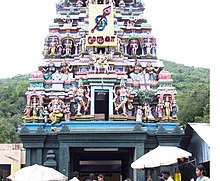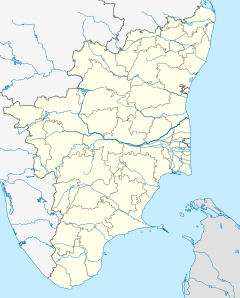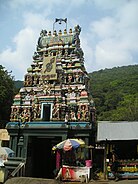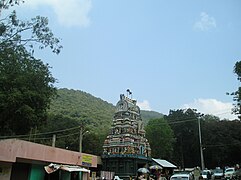| This article needs additional citations for verification. Please help improve this article by adding citations to reliable sources. Unsourced material may be challenged and removed. Find sources: "Murugan Temple, Pazhamudircholai" – news · newspapers · books · scholar · JSTOR (January 2017) (Learn how and when to remove this message) |
| Arulmigu Solaimalai Murugan Temple | |
|---|---|
| அருள்மிகு சோலைமலை முருகன் திருக்கோயில் | |
 View of the entrance View of the entrance | |
| Religion | |
| Affiliation | Hinduism |
| District | Madurai District |
| Deity | Murugan (Kartikeya) |
| Location | |
| Location | Dindigul 624401 |
| State | Tamil Nadu |
| Country | India |
 | |
| Geographic coordinates | 10°05′39″N 78°13′24″E / 10.094069°N 78.223445°E / 10.094069; 78.223445 |
| Architecture | |
| Type | Dravidian architecture |
| Creator | unknown |
| Completed | unknown |
| Website | |
| hrce.tn.gov.in | |
The Arulmigu Solaimalai Murugan Temple is a Hindu temple, located about 25 kilometres north of Madurai, atop a hill covered with dense forests. One of the six important abodes (Āṟupaṭaīvīṭukaḷ) of the deity Murugan located in Tamil Nadu, it is close to the Vishnu temple of Alagar Kovil.
The temple is maintained and administered by the Hindu Religious and Charitable Endowments Department of the Government of Tamil Nadu.

Description
Pazhamudircholai is located upon a hill and surrounded by a dense forest. According to legend, the forest was the home of the goddess Valli. The temple possesses shrines dedicated to the deities Murugan, Valli, Devasena, and Ganesha.
As one of the six sacred abodes of Murugan, hymns composed in the temple's praise are featured in ancient Tamil texts such as the Ettutokai, the Pattupattu, and the Cilappatikaram.
Gallery
References
- Hindu Religious and Charitable Endowments Act, 1959
- Anantharaman, Ambjuam (2006). Temples of South India (second ed.). East West. p. 127. ISBN 978-81-88661-42-8.

